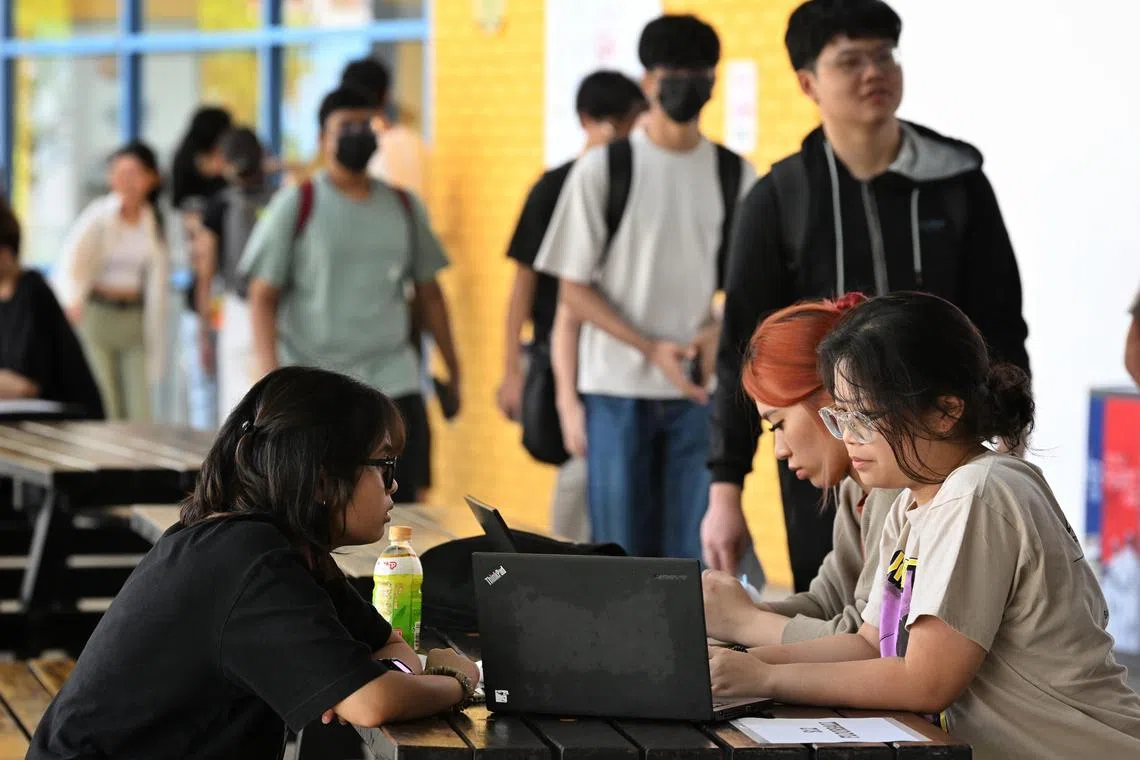NTUC pilot scheme to help young people make transition from school and NS to work
Sign up now: Get ST's newsletters delivered to your inbox

The Career Starter Lab will support ITE, polytechnic and university graduates as they make the transition to work life.
ST PHOTO: CHONG JUN LIANG
SINGAPORE – A pilot scheme that will allow young people to try out a job while being guided by a mentor will be launched in the second half of the year, as the National Trades Union Congress (NTUC) works to better support younger workers.
The Career Starter Lab, which works like an employment trial, will support Institute of Technical Education (ITE), polytechnic and university graduates, including those who have completed national service (NS), as they make the transition to work life.
They will be matched with suitable companies, where they will undergo an on-the-job training programme for three months with a workplace mentor.
Announcing the pilot scheme at a press conference on Thursday, NTUC secretary-general Ng Chee Meng said: “What we want to do is to help the youth coming into the workforce... with in-company mentors, with supervision and with structure, so that they have less anxiety as they move from the schoolhouse or post-NS into the workplace.”
This comes amid growing concerns around the world that the Covid-19 crisis might have lasting effects on young people who saw the start of their career disrupted.
The labour movement set up a youth task force in 2022
The task force has engaged more than 10,000 young people from institutes of higher learning.
Young NTUC executive secretary Wendy Tan said many of them expressed anxiety about going from school and NS to the world of work.
When asked what would give them more confidence, they cited quality internships and mentorship, so the pilot scheme is a response to this feedback, she added.
Under the scheme, companies will need to have vacancies with permanent roles or a one-year full-time contract to participate. NTUC hopes to sign up 100 companies and already has Singapore Airlines, Uniqlo, Rolls-Royce, Singtel and Copthorne King’s Hotel on board, among others, said Mr Ng.
The young people in the scheme will try out a job in these companies for three months, during which they will be paid between $1,800 and $4,200, depending on the work. This allows them, as well as the firms, to assess each other’s suitability before committing to a full-time position.
NTUC, working with the Singapore National Employers Federation (SNEF), will provide training for the workplace mentors. Mr Ng said the aim is to recruit 300 mentors, who will be workers in their 30s in the participating companies.
Employers will receive career trial support of up to $7.50 per hour for up to 480 hours, which work out to approximately three months, based on a 40-hour work week.
There will be a retention incentive for those young workers if they are hired by the company after the trial and retained for at least three months.
When the scheme is launched in the second half of the year, young jobseekers from the ITE, polytechnics and universities, who either graduated or just completed national service in 2023, will be able to apply, added Mr Ng.
Ms Pu Huan Jun, 20, who graduated from a polytechnic recently, said a bad internship experience drove home the importance of having a good mentor.
When she was attached to a company in the marine industry in 2022, she had a supervisor who was verbally abusive and often unwilling to answer questions about work, she told reporters on the sidelines of the NTUC press conference.
She felt she would have benefited more if she had been guided by a “professionally trained” mentor.

Ms Pu Huan Jun, who recently graduated from polytechnic, said having a “professionally trained” mentor would have helped her more during her internship.
PHOTO: LIANHE ZAOBAO
SNEF president Robert Yap, in his May Day message on Wednesday, called on employers to proactively train their employees, adding that the employers will be in a better position to know what skills are needed to meet their company’s future demand.
But he added that workers should also take charge of their own development and embrace lifelong learning to stay relevant and employable.
Manpower Minister Tan See Leng said in his May Day message on Wednesday that the Government, labour movement and companies will be at the forefront in helping workers and businesses adapt and thrive amid pressures on the global economy from technological disruptions and external events.
“Singapore’s approach is not to protect every job, but to protect workers by helping them to reskill and upskill to progress to better jobs,” he noted.
“Our progress on various fronts, ranging from workforce transformation to the strengthening of workers’ protection, shows how decades of trust and collaboration among tripartite partners have translated into concrete policies and programmes.”



